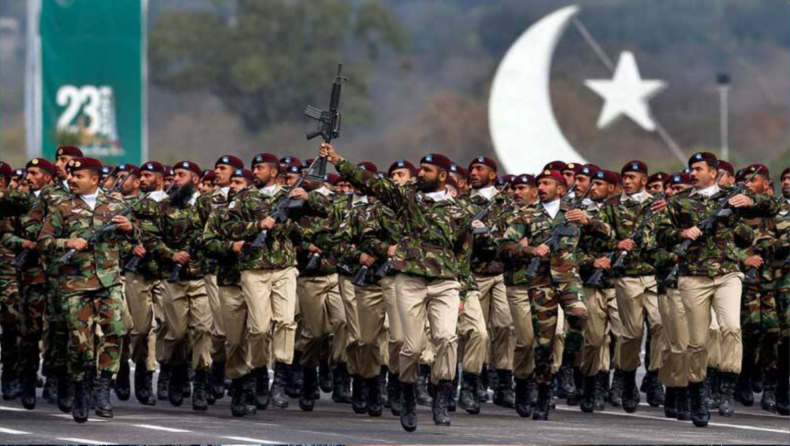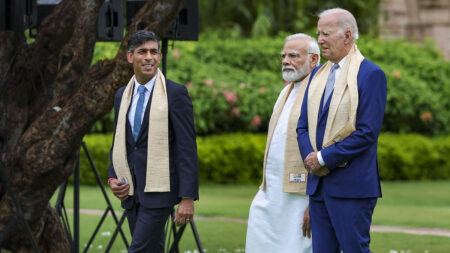According to defense expert Sanjiv Srivastava, Pakistan Army and the Inter-Services Intelligence (ISI) might carry out a coup d’état if the political situation in the country becomes more unstable.
Defense expert Sanjiv Srivastava further added, “In the coming days if we see a political or constitutional upheaval in Pakistan or an increase in instability then we cannot rule out the possibility of another coup in the country.
We have to see how the real rulers of Pakistan which are the Army and ISI respond to the events that transpired.”
Imran Khan very cleverly played a trick and the no-confidence vote which was brought in was dismissed by the Deputy Speaker by terming the “no-confidence motion as unconstitutional” this event triggered a question I.e., how can a deputy speaker take this decision?
Article 5 has two provisions which are as follows:
- Loyalty to the state is the basic duty of every citizen.
- Obedience to the Constitution and law is the [inviolable] obligation of every citizen wherever he may be and of every other person for the time being within Pakistan.
This is a typical scenario of a constitutional crisis and Imran Khan taking the advantage of the situation recommended the President dissolve the house and successfully passed the order to conduct fresh elections within 90 days.
Is Army behind fresh elections?
Imran Khan recently disclosed that the country’s establishment (widely read as the army) gave him three options to end the ongoing political turmoil. One was to face a no-confidence motion in parliament, hold fresh elections and step down from the post of PM.
Imran stressed that calling for an early election was a better option and quoted, “I said early elections are the best option and I could never think of resigning or face the no-confidence vote”
Imran Khan went on to refuse allegations that he was thinking of removing Army Chief General Qamar Javed Bajwa by saying it was “propaganda being spread by the PML-N”.
Pak Army’s influence
Though Pakistan is constitutionally a democratic parliamentary republic, the military has been in charge for half of its history spanning 74 years. Since 1947, Pakistan has been ruled by four different military rulers under three different military coups in 1958-71, 1977-88, and 1999-2008.
1. First Military Coup
Pakistan first came under military rule in 1958 when general Ayub Khan seized the presidency from Iskander Mirza. Officially Martial law lasted 44 months but Ayub Khan left office only in 1969 and named General Yahya Khan as his successor.
Like General Ayub Khan, Yahya Khan was the chief Martial Law Administrator and after an embarrassing loss to India in the 1971 war, Yahya Khan was forced to name Zulfiqar Ali Bhutto who won the nation’s first general election.
2. Second Military Coup
The second Military coup took place in 1977 when General Zia ul Haq dissolved the parliament and placed Bhutto under house arrest. He resigned in 1985 after picking Muhammad Khan Junejo as the country’s new prime minister.
General Zia ul Haq continued as president till his death in a plane crash in 1988.
3. Third Military Coup
The third and last military coup took place in 1999 when General Pervez Musharraf ousted Nawaz Sharif who was facing criticism for retreating from Kargil. General Musharaf resigned in 2008 with Asif Ali Zardari becoming the new president.
18Th Amendment
In an attempt to stop the cycle of long military rule followed by a brief stint of an elected government, the National Assembly 2010 passed the 18th Constitutional Amendment. This amendment removed the power of the president to dissolve the parliament unilaterally.
Though Pakistan has since seen fairly democratic transitions of power the influence of the army on the decision-making bodies has not reduced and in fact, in some recent developments in Pakistan and the no-trust vote against Prime Minister Imran Khan suggests that the influence has increased in subtler ways.
What can we expect?
The opposition moved the Supreme Court on the 3rd of April against the dissolution of the National Assembly. Consequently, the three-member bench of the Pakistan Supreme Court began hearing the Opposition’s plea over the dissolution of the National Assembly on Sunday.
Pakistan’s Chief Justice Umar Ata Bandial noted that all orders and actions initiated by the Prime Minister and the President regarding the dissolution of the National Assembly will be subject to a court order.
Published By – Damandeep Singh
Edited By- Kritika Kashyap













